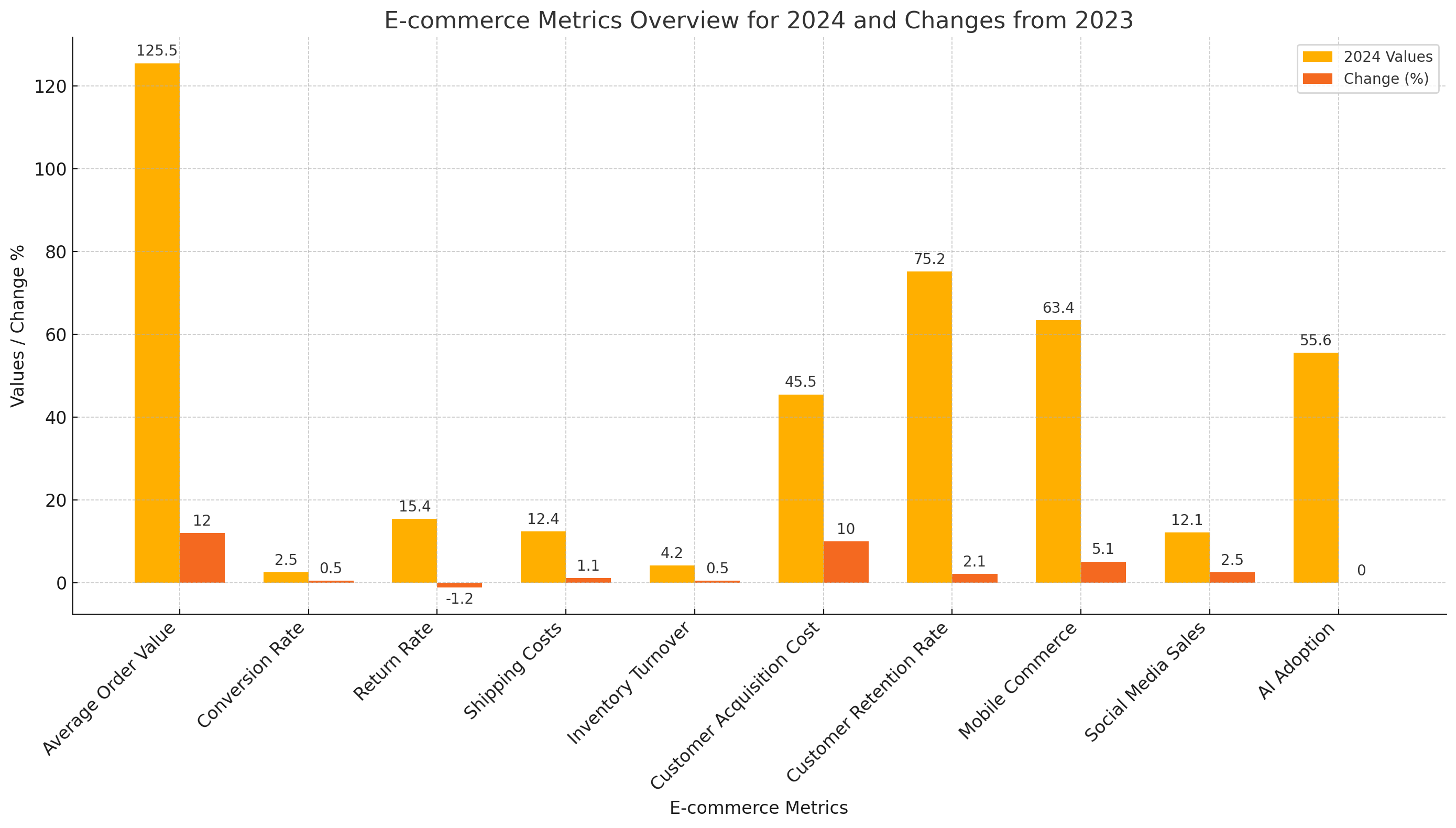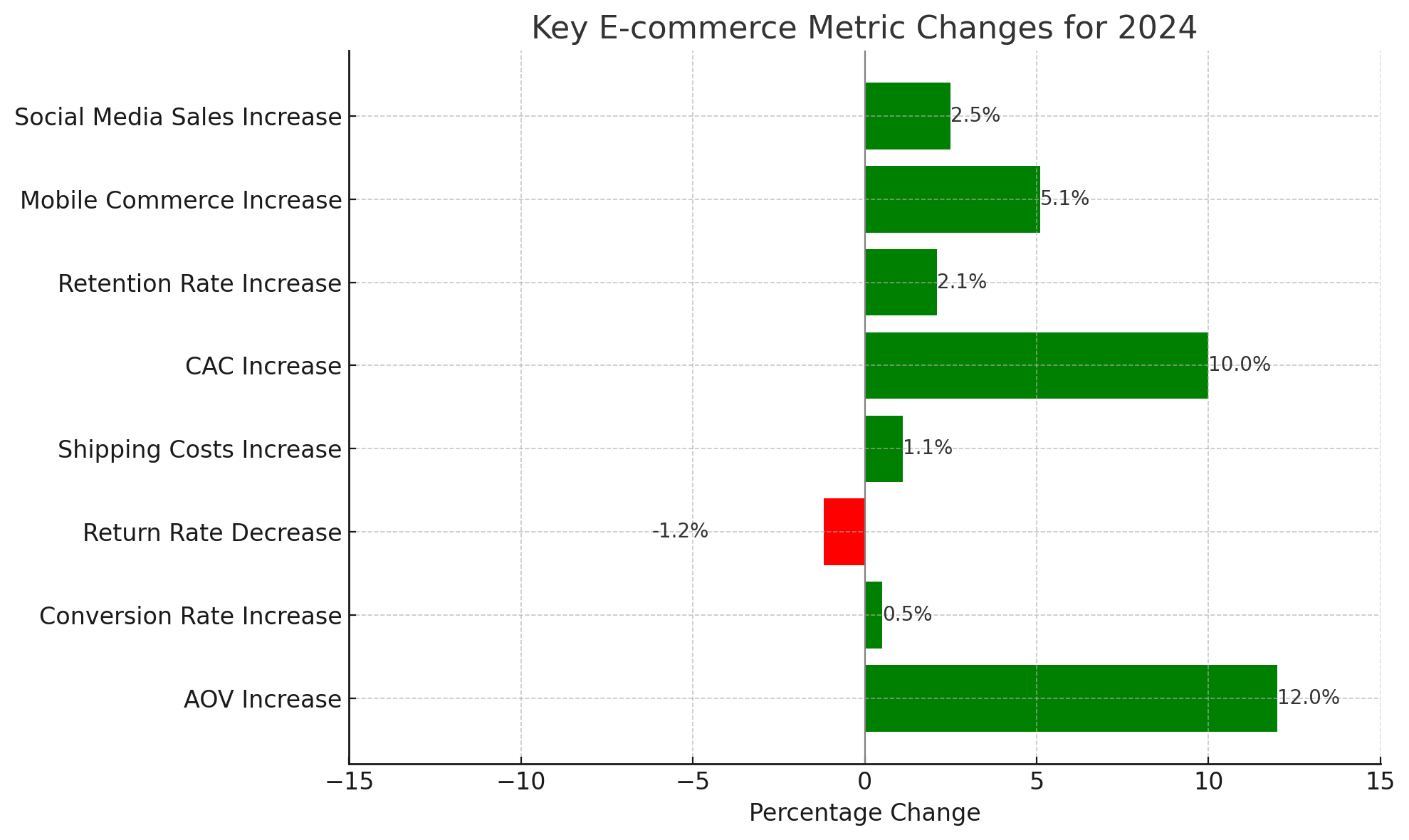Managing E-Commerce Operations: Insights and Strategies
Key Takeaways
| Key Metric | 2024 Forecast |
|---|---|
| Average Order Value (AOV) | $125.50 (up 12% from 2023) |
| Conversion Rate | 2.5% (up 0.5% from 2023) |
| Return Rate | 15.4% (down 1.2% from 2023) |
| Shipping Costs | 12.4% of total revenue |
| Customer Acquisition Cost (CAC) | $45.50 (up 10% from 2023) |
| Customer Retention Rate | 75.2% (up 2.1% from 2023) |
| Mobile Commerce | 63.4% of total e-commerce sales |
| Social Media Sales | 12.1% of total e-commerce sales |
| AI Adoption | 55.6% in e-commerce businesses |
As we delve into 2024, managing e-commerce operations necessitates integrating data-driven strategies and emerging technologies into traditional business practices. The e-commerce landscape is continuously morphing, influenced by changing consumer behaviors, technological advancements, and competitive dynamics.
Introduction: Embracing Evolution in E-commerce

The e-commerce spectrum is vast and varied, comprising an array of operations vital for sustaining and growing an online business. As we navigate through these changes, understanding and adapting to these fluctuations become pivotal.
Laying the Groundwork for E-commerce Success
Setting up an e-commerce venture requires meticulous planning and understanding of the digital marketplace. A thorough analysis lays the foundation for success, encompassing:
- Business model viability
- Marketplace understanding
- Product-market fit

For a deeper dive, explore our guide on Setting Up an E-commerce Business.
Navigating E-commerce Marketing Strategies
In the digital era, marketing strategies have transformed from mere advertisements to creating meaningful connections. Successful e-commerce marketing strategies include:
- Search Engine Optimization (SEO)
- Content marketing
- Social media engagement

Delve further into effective marketing strategies with our comprehensive guide on E-commerce Marketing Strategies.
Enhancing Operations through Digital Tools
The implementation of digital tools in inventory management, customer service, and data analytics significantly enhances operational efficiency. By leveraging these technologies, businesses can achieve:
- Streamlined operations
- Heightened customer satisfaction
- Informed decision-making

Launching Your E-commerce Store
Creating an e-commerce store that reflects your brand while ensuring a smooth user experience is crucial. Key considerations include:
- Responsive design
- Secure payment gateways
- User-friendly navigation

Read more on launching your store in our Starting Your Own E-commerce Online Shop guide.
Mastering Digital Marketing
The digital marketing landscape is ever-changing, with tactics such as email marketing, PPC advertising, and influencer collaborations playing pivotal roles in attracting and engaging customers.

For an in-depth exploration, visit our Digital Marketing page.
Conclusion: Sustainable Strategies for E-commerce Growth
Navigating the complexities of e-commerce operations requires a blend of innovative thinking, strategic planning, and embracing technological advancements. With the right mix of technology, marketing strategies, and operations management, businesses can stay ahead in the competitive e-commerce landscape.
Encouraging continuous learning and adaptation, we aim to provide resources and insights that empower e-commerce professionals. As we move forward into 2024, staying attuned to the latest trends and data will be key to driving success in the e-commerce domain.


